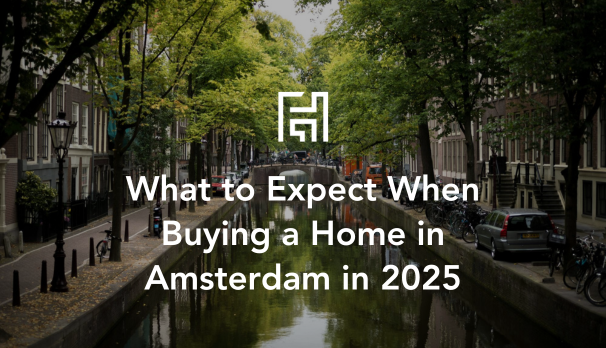Buying a house in Amsterdam - how it works for expats

Amsterdam is a beautiful city; famous for its iconic houses and architecture. In recent years, the property market in Amsterdam has shown very strong growth, boosted by a steady influx of talented and well-paid professionals. Buying a house in Amsterdam has some distinct advantages, however there are some initial ‘startup costs’ that have to be factored-in. The process of buying a house in Amsterdam may also be different to what you expect.
In Amsterdam, houses are less common than apartments, especially in the center where space is limited. When you buy an apartment or house, you’ll pay various taxes and fees, plus you’ll be liable for additional taxes and charges as a property owner, any VvE (Homeowner’s Association) charges, and certain insurance costs.
What's the cost of buying property in Amsterdam?
Mortgage payments (based on zero equity) are similar to rental costs for the same apartment, so there’s a definite saving over the longer-term. When you eventually sell the apartment you will recoup any equity you have built up.
How the cost of buying in Amsterdam varies by location
Prices of apartments vary according to location – no surprise there. This variation can be significant, and prices change every year – usually, they go upwards. You should be aware that the published prices are always ‘asking prices’ (vraagprijs, in Dutch). In some areas, this is just a benchmark for where negotiations start, but not in Amsterdam.
In the capital (and most of the Randstad), the asking price is a starting price for bids - and this will be much lower than the final selling price.
There’s no fixed, ‘percentage difference’ between the asking price and the final price, but you can always expect to pay more than the asking price. Depending on how keen the agent is to encourage more bidders, the asking price could be 5% to 30% lower than the actual selling price. Smaller apartments often have more competitive bidding too.
Apartments in areas like the New-west will have asking-prices of around €4000/m2, whereas in Amstelveen (a huge suburb south of Amsterdam) this might be around €5500/m2.
In many areas within ‘the ring’ (the A10 highway that encircles the central part of Amsterdam) you can expect to see asking prices of €6700/m2 in most ‘regular’ neighborhoods, and up to €12,500/m2 in upmarket Willemspark.
Note, these are based on the ‘asking prices’ in 2021, and the majority of apartments sell for amounts well above the asking price. You can expect these prices to increase in-line with inflation, at the least.
How buying a house in Amsterdam works
The process for buying a house in Amsterdam is broadly very similar to many other places, but with some subtle differences. Many buyers use a buyer’s agent to help them get their own place. All buyer’s agents (aankoopmakelaars) will advise you on the maximum price they think it’s worth bidding, and assist with getting various surveys, checks and tests done.
The buyer’s agent can also do the entire property search too, and find properties that match your requirements. These days, many people do this themselves but may use the buyer’s agent to help with negotiations for the ‘final mile’.
Another vital role is filled by the Notary (notaris) who performs the conveyancing and mediates the whole transaction, once a bid is accepted.
Read more about the procedure for buying an apartment or house in the Netherlands.
Navigating the property market in Amsterdam
It can be a little overwhelming when you start your search for somewhere to live. However, take heart: it’s a temporary process, and you’ll be happily settled in your new home within a relatively short time.
Although the cost of rent in Amsterdam is less than many capital cities, it’s still quite expensive compared to other Dutch cities. It is most helpful to start your search with clear ‘red lines’. These are your ‘must haves’ and ‘mustn’t haves’, and these should be as few as possible to give you a chance of finding anything suitable within your lifespan.
Most Amsterdammers have to decide between space and location, for example, because unless money is no object, you will struggle to find anything affordable that is both spacious and central.
So, before you start looking in earnest, look at a map of the city, and draw a radius or shade in areas that match your needs. Then you can start looking at the properties in those areas online, and see if they are at all affordable.
Eliminate any areas that are just too expensive, and focus your efforts on those areas that match your needs and budget.
Feel at home
When you do go for a property viewing, spend some time in the area and go for a coffee at a nearby cafe. This will give you a good feel for whether it’s the right place for you.
Feeling at home is the most important thing, so take some time to see if it feels right for you before committing to a contract. There’s a lot of choice in the city, and new apartments become available every day - your perfect home is just waiting for you to find it.
We’d love to help you, so let us know if there’s anything we can do for you!
Last updated: September 13, 2022


.jpg)
